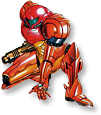"I completely eradicated them except for a larva, which after hatching followed me like a confused child..."

Article by: Paul Watkins (watkinzez)
Pictured from: Metroid II: Return of Samus
Created by: Nintendo
First appearance: 1986
Bio
This article is one of two Samus biographies. For more information, see the Samus Aran (Prime) bio.
Samus Aran and the Metroid series of games remain black sheep among Nintendo-developed games, though not because of quality. Rather, this is because the games are to some degree the opposite of what many people associate with the company, featuring ominous terrain to traverse, surprisingly deep and immersive storylines, and a feminine hero who fails to conform to video game stereotypes. Samus was never truly revealed to players — and was presumed male by most players — until the end of the NES game Metroid. In this game, her impact is as a character first and as a female second.
Going against the traditional princess-in-distress role, the bounty hunter Samus Aran first appeared in Metroid, a project headed up by Gunpei Yokoi (who would go on to create the original Game Boy). Here Samus accepts a job to eliminate a batch of Metroids, dangerous parasites, that was stolen by the Galactic Federation's enemy: the Space Pirates. The Metroids pose a threat to the peace of the galaxy because the Pirates are breeding them as an army for their leader, Mother Brain. The game is remembered as a nonlinear experience, contrasting with the "beat 'em up" games of the day. Vertical scrolling of the screen allowed Samus to explore intricately designed caverns under the surface of Zebes, the planet on which the game is set. The sequel, Metroid II: Return of Samus, tells of the bounty hunter's mission to eradicate the Metroid species on its home planet, SR388.
Samus returned in the 1994 SNES game Super Metroid, which took advantage of the increased power of the medium. Using the 24-megabit cartridge, the largest of the time, Nintendo created a vast, expansive setting back on Zebes. Samus starts her mission with the intent of recovering a stolen Metroid research subject, the last of the species. Ridley, an antagonist from the original game, attempts to use the Metroid to resurrect both the Space Pirate army and ultimately Mother Brain.
While some see the games as a mild diversion from the platform games of their time, the intimacy with Samus as a character helped the games become an immersive and memorable experience. For a character with little backstory and virtually no dialogue, the lone hunter traversing desolate, alien landscapes is an unforgettable part of video game history.
Selected game appearances
NES
- Metroid (1986)
Game Boy
- Metroid II: Return of Samus (1991)
Super NES
- Super Metroid (1994)
- Super Mario RPG: Legend of the Seven Stars (1996)
Nintendo 64
- Super Smash Bros. (1999)
Game Boy Advance
- Metroid Fusion (2002)
- Metroid: Zero Mission (2004)
GameCube
- Super Smash Bros. Melee (2001)
- Metroid Prime (2002)
- Metroid Prime 2: Echoes (2004)
Wii
- Metroid Prime 3: Corruption (2007)
- Super Smash Bros. Brawl (2008)
- Metroid: Other M (2010)
Wii U
- Super Smash Bros. for Wii U (2014)
Nintendo 3DS
References
- Wikipedia - "Samus Aran"
- Wikipedia - "Super Metroid"
- Super Metroid instruction manual
- Hyper magazine #119 - "The Real Girl Gamers"
